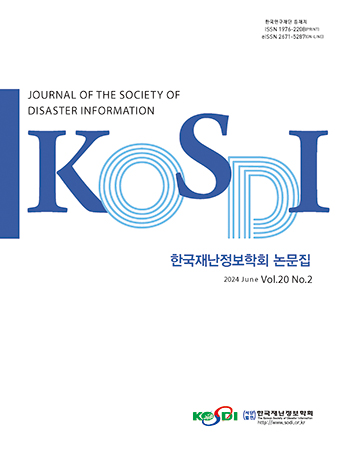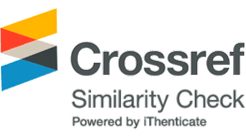Original Article
Abstract
References
Information
Purpose: This study was conducted for Pohang citizens who experienced Pohang earthquake damage. The purpose of this study is to examine how these post-traumatic stress level affect post-traumatic growth and to examine the mediating effects of stress coping on the causal relationship between post-traumatic stress level and post-traumatic growth. Method: The survey was conducted for the citizens who experienced Pohang earthquake, and the survey data were statistically analyzed using the SPSS 25.0 program. Result: Post traumatic stress level has been shown to affect post traumatic growth. In addition, as a result of examining the mediating effect of stress coping method on the relationship among these variables, the problem solving center and the social support method had a mediating effect, but the evasion method did not mediate. Conclusion: The post-traumatic stress level caused by disasters such as earthquakes was found to be able to overcome the obstacle and grow after trauma, as the coping method is problem solving and social support.
연구목적: 본 연구는 포항 지진피해를 경험한 포항시민들을 대상으로 이들의 외상 후 스트레스 수준이 외상 후 성장에 어떠한 영향을 미치는지를 살펴보고, 나아가 외상 후 스트레스 수준과 외상 후 성장간의 인과 관계에 있어 스트레스 대처 방식의 매개효과를 검증하는데 목적이 있다. 연구방법: 포항지진을 경험한 시민을 대상으로 설문조사를 수행하였으며, 조사 자료는 SPSS 25.0 프로그램을 활용하여 다중회귀분석 등의 통계적 분석을 수행하였다. 연구결과: 외상 후 스트레스 수준은 외상 후 성장에 영향을 미치는 것으로 나타났다. 또한 이들 변인들 간의 관계에 있어 스트레스 대처 방식의 매개효과를 살펴본 결과 문제해결중심과 사회적지지 추구방식은 매개효과가 있었지만 회피중심 방식은 매개하지 않는 것으로 나타났다. 결론: 지진과 같은 재난으로 인한 외상 후 스트레스 수준은 대처 방식이 문제해결중심이고 사회적지지 추구 방식일수록 스트레스를 극복하고 외상 후 성장할 수 있음을 확인하였다.
- Aldwin, C.M., Levenson, M.R., Kelly, L. (2009). Life Span Developmental Perspectives on Stress-Related Growth. 10.1037/11854-005
- American Psychiatric Association (2013). Diagnostic and Statistical Manual of Mental Disorders (DSM-5). American Psychiatric Pub. 10.1176/appi.books.9780890425596
- Amirkhan, J. H. (1990). "A factor analytically derived measure of coping: The coping strategy indicator." Journal of Personality and Social Psychology, Vol. 59, No. 5, pp. 1066-1074. 10.1037/0022-3514.59.5.1066
- Bellizzi, K.M., Blank, T.O. (2006). "Predicting post traumatic growth in breast cancer survivors." Health Psychology, Vol. 25, No. 1, p. 47. 10.1037/0278-6133.25.1.47 16448297
- Calhoun, L.G., Tedeschi, R.G. (2006). Handbook of Post Traumatic Growth. MahWah, NJ: Lawrence Erlbaum Associates.
- Horowitz, M., Wilner, N., Alvarez, W. (1979). "Impact of event scale; a measure of subjective stress." Psychosom Medicine, Vol. 41, pp. 209-218. 10.1097/00006842-197905000-00004 472086
- Eun, H.J., Kwon, T.W., Lee, S.M., Kim, T.H., Choi, M.R., Cho, S.J. (2005). "A study on reliability and validity of the Korean version of impact of event scale-revised." Journal of Korean Neuropsychiatric Association, Vol. 44, No. 3, pp. 303-310.
- McFarlane, A.C., Yehuda, R., Clark, C.R. (2002). "Biologic models of traumatic memories and post traumatic stress disorder: The role of neural networks." Psychiatric Clinics of North America, Vol. 25, No. 2, pp. 253-270. 10.1016/S0193-953X(01)00008-9
- Ministry of the Interior and Safety (2018). 2017 Pohang Earthquake Whitepaper.
- Ministry of Health and Welfare (2017). The Survey of Mental Disorders in Korea.
- Shin, H.J., Kim, C.D. (2002). "A validation study of coping strategy indicator (CSI)." Korean Journal of Psychology, Vol. 14, No. 4, pp. 919-935.
- Shin, H.Y., Hwang, S.T., Shin, Y.T. (2015). "The relationship between traumatic events and PTSD symptomes of urban fire fighters: Focusing on the moderating effects of type D personality and coping style." Journal of Safety and Crisis Management, Vol. 11, No. 6, pp. 97-120.
- Song, S. H., Lee, H. S., Park, J. H., Kim, K. H. (2009). "Reliability and validity of a Korean version of the post traumatic growth inventory." Korean Journal of Psychology, Vol. 14, No. 1, pp. 193-214. 10.17315/kjhp.2009.14.1.012
- Taylor, S.E., Armor, D.A. (1996). "Positive illusions and coping with adversity." Journal of personality, Vol. 64, No. 4, pp. 873-898. 10.1111/j.1467-6494.1996.tb00947.x 8956516
- Tedeschi, R.G., Calhoun. L.G. (2004). "Post traumatic growth: Conceptual foundations and empirical evidence." Psychological Inquiry, Vol. 15, No. 1, pp. 1-18. 10.1207/s15327965pli1501_01
- Yoo, H.J., Lee, J.E. (2010), "Quality of life in taean community after hebei spirit oil spill from the viewpoint of job." Korean review of crisis and emergency management, Vol. 6, No. 3, pp. 63-85.
- Publisher :The Korean Society of Disaster Information
- Publisher(Ko) :한국재난정보학회
- Journal Title :Journal of the Society of Disaster Information
- Journal Title(Ko) :한국재난정보학회논문집
- Volume : 16
- No :4
- Pages :658-669
- DOI :https://doi.org/10.15683/kosdi.2020.12.31.658




 Journal of the Society of Disaster Information
Journal of the Society of Disaster Information







